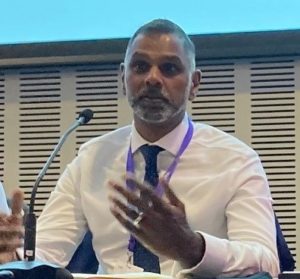Mazars’ Suresh Patel suggests three steps that auditors and council finance teams should take to help get financial reporting and local audit back on track.
 Following my recent appearance on a CIPFA conference panel, I’ve been trying to think of an analogy that reflects the situation facing local government financial reporting and local audit. As a cinephile, I can only think of film titles. So far, I’ve got The Perfect Storm, Groundhog Day, The NeverEnding Story and Terminator 2: Judgment Day. Believe it or not, there is even a 2017 film called ‘The Auditor’… I haven’t seen it, so can’t comment, but I’m sure it’s thrilling.
Following my recent appearance on a CIPFA conference panel, I’ve been trying to think of an analogy that reflects the situation facing local government financial reporting and local audit. As a cinephile, I can only think of film titles. So far, I’ve got The Perfect Storm, Groundhog Day, The NeverEnding Story and Terminator 2: Judgment Day. Believe it or not, there is even a 2017 film called ‘The Auditor’… I haven’t seen it, so can’t comment, but I’m sure it’s thrilling.
Recently, the Financial Reporting Council published its annual inspection reports on the audits of some of the largest and most complex companies by the top seven UK audit firms. While overall there has been an improvement in audit quality, two firms, including my own, were reported as having unacceptable audit quality. While these reports were not focused on local audits, it’s evident from what has been published, reported and spoken that that the current problems and challenges facing the audit profession generally and the local audit system in particular are not going away anytime soon.
There’s also a risk that we are all unreasonably looking at the new system leader (ARGA – the Audit, Reporting and Governance Authority) as the golden ticket that will open the doors to the Wonka chocolate factory (my last cinematic reference!).
I would challenge whether we want to throw out IFRS as the basis for good quality financial reporting in local government, not least because it works for much of the rest of public sector, including the NHS and central government.
Don’t throw out IFRS
So what is to be done? Is there anything we can do to turn the tide? What’s within our control?
I’ve seen a recent Room151 article from an experienced section 151 officer who suggests we are all looking through the wrong end of the telescope (great analogy) and we should be reducing ‘the demand for a meaningless level of detail’ in local authority accounts. I don’t disagree with the sentiment, but would challenge whether we want to throw out IFRS as the basis for good quality financial reporting in local government, not least because it works for much of the rest of public sector, including the NHS and central government.
In my mind there are three things that auditors and finance teams can control to start chipping away at the challenges we face so we can start to see some light at the end of what has been for some time now a very gloomy tunnel.
- Be realistic and honest about what is achievable
Auditors and finance teams need to be open and honest with each other about what is achievable and by when. This applies equally to the preparation of the statement of accounts and all relevant supporting records as it does to the timetable for the audit process with an appropriately resourced audit team. Ideally, this open and honest dialogue will enable timetables to be set that are recognised on both sides as deliverable. This dialogue needs to be regular and with the right level of seniority.
- Do throw out the ‘meaningless detail’
To steal a phrase, finance teams should utilise the scope within the code of practice on local authority accounting to consider the materiality of disclosures and the relevance of accounting policies so they can reduce some of the meaningless detail. Auditors should work with preparers to provide a view on the appropriateness of what is not being included or being disclosed in less detail. Auditors should also draw on the benefit they have from seeing numerous different versions of local authority accounts to highlight good practice in concise and meaningful detail.
While it’s easy to point the finger, I do genuinely believe both auditors and finance teams are working for the same goal to get financial reporting and local audit back on track
- Project manage the process
With resourcing for both auditors and finance teams remaining a challenge, we all need to make best use of what we have by supporting our teams with clarity on what they need to do, how and by when. And we should be monitoring and actively managing progress. We should be applying detailed and strong project management techniques so that auditors and finance teams have visibility on progress with the accounts and audit process, can see the critical path and take prompt remedial action when things start going off track. The process will not run effectively without strong project management from both teams.
While it’s easy to point the finger, I do genuinely believe both auditors and finance teams are working for the same goal to get financial reporting and local audit back on track. It may take longer than we all want but, rather than waiting for system reform or another working group, at least the three actions above are within our gift and within our control.
Suresh Patel is a partner at Mazars.
—————
FREE weekly newsletters
Subscribe to Room151 Newsletters
Room151 LinkedIn Community
Join here
Monthly Online Treasury Briefing
Sign up here with a .gov.uk email address
Room151 Webinars
Visit the Room151 channel













